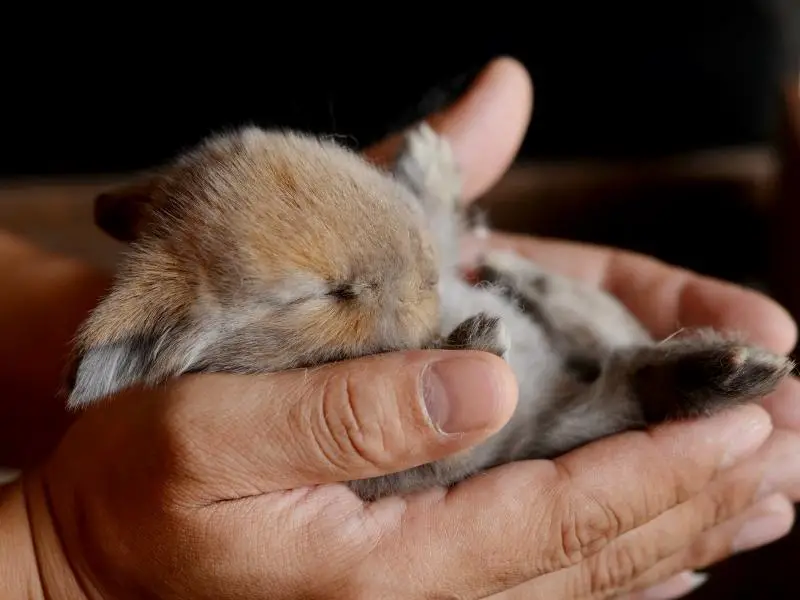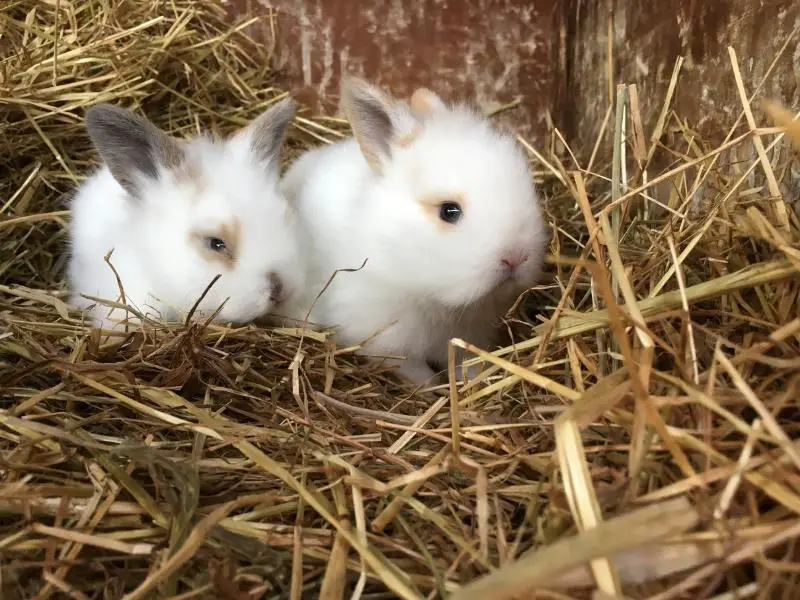There’s excitement knowing your bun is about to kindle (give birth). Baby bunnies are just the cutest animals under the sun. Realizing that the number of kits (babies) in the litter is dropping can be traumatic for any bunny owner (especially when there’s no trace of the dead babies anywhere).
This begs the question, do rabbits eat their babies?
Rabbits do eat their babies, but this is a very rare occurrence. Rabbit will eat their babies if they are stressed, feeling territorial, inexperienced with the kindling (birthing) process, lacking protein in their diet, or trying to evade predators. A rabbit can also eat their kit by accident.
Has your doe (female rabbit) kindled a litter and started eating her kits? This can be a heartbreaking realization.
If you are trying to understand the reasons behind this act and how to prevent it from happening again, this guide will provide you with all the information you’ll need.
Reasons Why Your Rabbit Might Eat Their Babies
Unlike other animals, female rabbits don’t have a very maternal side to them. This isn’t necessarily because they are heartless but more because they are prey animals.
That being said, rabbits aren’t likely to eat their kits (baby rabbits).
Let’s take a closer look at why your rabbit might eat their babies:
Kit Is Stillborn
Once a wild rabbit notices that a kit is stillborn, it’ll eat them. This is their way of ensuring predators don’t pick up the smell of death and decay. By doing this, they’re protecting the rest of the litter (and themselves).
A domestic rabbit may not eat a stillborn kit, but there’s a chance this might happen.
Inexperienced Mother
If your doe is young (under 6 months) and it’s the first time she is giving birth, she may become overwhelmed by the whole process.
She may not understand why the kits are coming out of her, and she could eat them out of fear and confusion.
It can take time for your bun’s maternal instincts to kick in (especially if they’re young).
An Accident
Your bun can eat her babies accidentally, which is common for inexperienced doe’s. Once your doe has kindled her litter, she will start cleaning the newborn kits.
She will then eat the placenta and afterbirth material to give her extra nutrients (to make milk for her kits).
If your doe is in a hurry to eat the afterbirth (the smell of blood could attract predators), she can accidentally eat her kits along with the placenta and afterbirth.
Territorial
After kindling her litter, your doe can suddenly become territorial and not want to share her living space with the kits. This leads her to eat her babies, so they’re no longer a threat to her.
Male rabbits can also become territorial and aggressive toward the kits (although they are far less likely to eat them).
This is why it’s essential to separate the male and female rabbit when it’s time for the doe to kindle or when you realize she’s pregnant.
Survival of the Fittest
If the doe finds a runt (smallest and weakest) in the litter, she will eat them. Rabbits naturally have the survival of the fittest instinct.
The mother will spare the strong babies, who are more likely to survive predator attacks.
How to Prevent Rabbits From Eating Their Babies

If your female rabbit has eaten her first litter (or one of the kits) and is pregnant again, it’s essential to take steps to prevent the doe from eating their next litter of kits (especially if she hasn’t developed maternal instincts from her first kindling).
Here are a few ways you can prevent rabbits from eating their young:
1. Ensure your bun has access to Alfalfa hay and fresh water while they’re pregnant. This will give them all the nutrients they need when the kits are born.
2. Don’t let young dogs breed.
3. Reduce your pregnant doe’s stress levels with a dark place to hide and keep the noise levels down.
4. Take your bun for regular checkups at the vet to make sure she’s healthy.
5. Monitor the kits in the early stages after kindling.
6. Ensure the buck (male rabbit) doesn’t stay with the pregnant or just kindled doe in the cage. Keep him in a nearby but separate cage.
How to Stop a Rabbit From Eating Her Babies
Let’s take a closer look at how to stop a rabbit from eating her babies:
Monitor the Kits
Once the kits are kindled, watch the mother closely. Ensure she doesn’t accidentally eat one of the kits while eating the placenta and afterbirth.
If she shows any signs of confusion while eating the placenta, move the babies away from where she is eating.
You will also want to count the kits and make sure the headcount stays the same throughout the first few days after the kindling.
Distraction
If your bun shows any interest in eating her babies, distract her with toys or treats. By doing this, she will relax, and her attention won’t be on her kits.
By the time she returns to them, she should be calmer and less likely to eat her babies.
Prevent Loud Noises
If your bun feels threatened by sudden loud noises or quick movements, she may react instinctively to protect herself and her young.
Eating her kits makes your bun think she is protecting them from predators.
Should I Remove My Rabbit’s Babies
If you aren’t successful in stopping the mother rabbit from eating her babies, you will have to keep her away from the kits.
You will, however, need to let your bun feed the kits when necessary (under supervision).
After 24 hours, you can try to re-introduce the kits to your bun. If she still displays aggression toward the kits, you may have to remove the litter completely.
If this is the case, you should contact your vet so they can provide you with the necessary feed and advice to raise a litter of orphaned kits.
My Last Bunny Thoughts
Realizing that your floppy-eared friend might not have motherly instincts can be hard to come to terms with.
It’s important to remember that your bun may eat her own kits for many different reasons, and this cannibalistic trait is normal – though rare – for rabbits.
If your bun is pregnant, make sure you take her for regular checkups at the vet and monitor the kits closely after birth.
Keep the male rabbit (buck) away for the first week or two to avoid further aggressive behavior toward the kits. Having the buck in the enclosure can also stress the doe out.
Good luck!
Related Articles:


